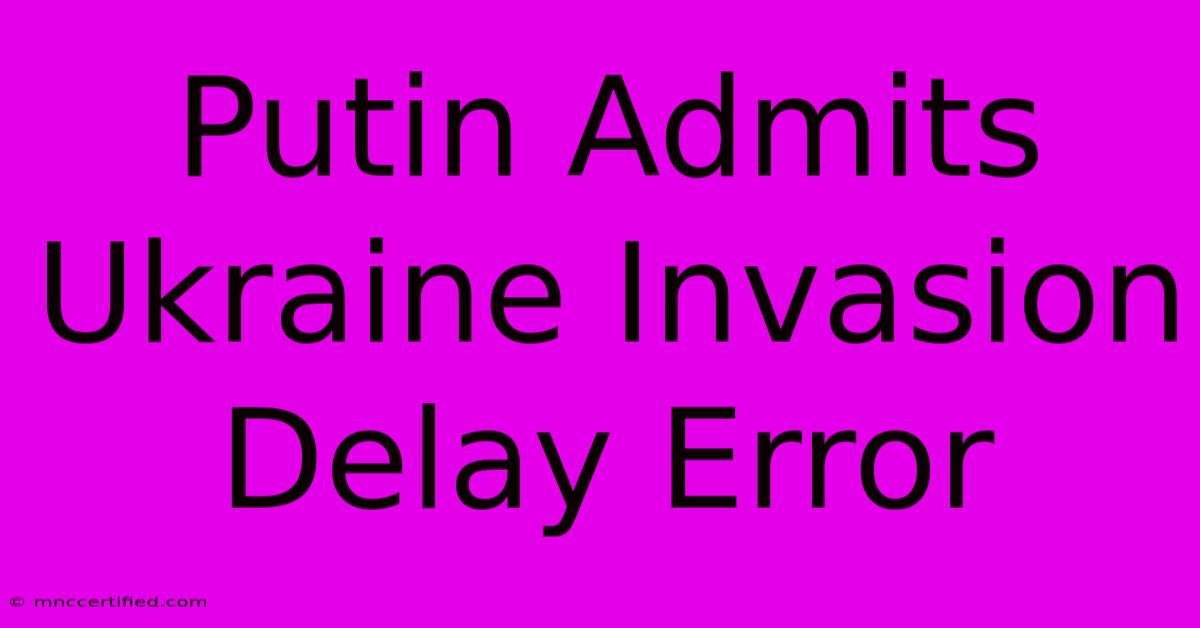Putin Admits Ukraine Invasion Delay Error

Table of Contents
Putin Admits Ukraine Invasion Delay Error: A Strategic Miscalculation?
Russia's invasion of Ukraine, launched in February 2022, has been widely condemned as an act of unprovoked aggression. While the Kremlin initially portrayed the operation as a swift, decisive victory, the conflict has dragged on far longer than anticipated, resulting in significant losses for Russia and a protracted humanitarian crisis. Recently, there have been subtle admissions from within the Russian establishment hinting at strategic errors in the planning and execution of the invasion. This article delves into these admissions, particularly focusing on claims of a delayed invasion, analyzing the potential consequences of this delay and its implications for the ongoing conflict.
The Admission and its Context
While President Putin himself hasn't explicitly stated a "delay error," comments from various high-ranking Russian officials and leaked internal documents suggest a recognition that the timing of the invasion wasn't optimal. These indirect admissions are often veiled in carefully worded statements, emphasizing unforeseen challenges rather than outright mistakes. The context is crucial: these admissions are not necessarily an acknowledgement of fault, but rather an attempt to explain the unexpected difficulties encountered in Ukraine.
Analyzing the Reported Delay
Reports suggest the initial invasion plan was slated for an earlier date, potentially months before the actual February 2022 launch. The reasons behind the alleged delay remain largely speculative but several theories exist:
- Weather Conditions: The harsh winter conditions in Ukraine could have impacted military mobility and logistical operations, making an earlier invasion less feasible.
- Intelligence Gaps: It's possible that Russian intelligence underestimated Ukrainian resistance and the level of Western support, prompting a reevaluation of the invasion timeline.
- Internal Disputes: Differences of opinion within the Russian military and political leadership regarding the best course of action might have contributed to the delay.
The exact nature and extent of the delay are uncertain, with varying accounts circulating. However, the very existence of these conflicting narratives highlights the internal uncertainty and challenges faced by the Russian leadership in planning and executing the invasion.
The Consequences of a Delayed Invasion
A delayed invasion, even if only by a few weeks or months, could have had significant consequences:
- Increased Ukrainian Preparedness: The extra time allowed Ukraine to bolster its defenses, mobilize its forces, and receive crucial military aid from Western allies. This increased preparedness undoubtedly contributed to the prolonged and costly nature of the conflict for Russia.
- Strengthened International Condemnation: The delay potentially allowed for greater international mobilization against the invasion. The increased time for diplomatic efforts and the build-up of sanctions likely increased the economic and political pressure on Russia.
- Shifting Geopolitical Landscape: The longer timeline allowed for a greater shift in the geopolitical landscape. Western support for Ukraine solidified, and new alliances were formed, further complicating Russia's objectives.
Implications for the Future of the Conflict
The alleged delay highlights the inherent complexities and uncertainties in military planning, particularly in a context as volatile as the Ukraine conflict. The admission, whether direct or indirect, exposes potential vulnerabilities in Russian intelligence gathering and strategic decision-making. This recognition of past errors could have significant implications for future Russian military operations. It suggests a need for improved intelligence gathering, more accurate risk assessments, and perhaps even a reevaluation of Russia's overall strategic objectives in the region.
Conclusion: A Strategic Miscalculation?
The suggestion of a delayed invasion in Ukraine, whether confirmed or not, reveals potential flaws in Russian strategic planning and execution. The consequences of this delay – enhanced Ukrainian preparedness, stronger international condemnation, and a shifting geopolitical landscape – have significantly impacted the conflict's trajectory. Whether this constitutes a significant "error" or simply an unforeseen challenge remains a matter of ongoing debate, but it underscores the critical importance of accurate intelligence, thorough planning, and adaptability in modern warfare. The long-term impact of this alleged miscalculation is yet to be fully understood, but it undoubtedly holds important lessons for military strategists and geopolitical analysts alike.

Thank you for visiting our website wich cover about Putin Admits Ukraine Invasion Delay Error. We hope the information provided has been useful to you. Feel free to contact us if you have any questions or need further assistance. See you next time and dont miss to bookmark.
Featured Posts
-
You Tube Beast Games A 100 M Review
Dec 20, 2024
-
Potomac Housewife Found Guilty In Maryland
Dec 20, 2024
-
Betting On Broncos Vs Chargers Tnf Guide
Dec 20, 2024
-
Ukraine Invasion Putins Regret
Dec 20, 2024
-
Beast Games Review 100 M You Tube Flop
Dec 20, 2024